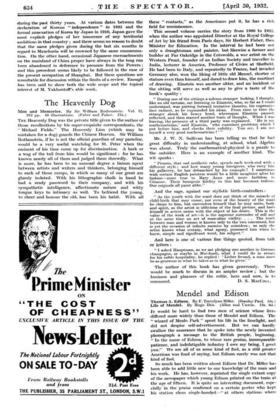The Heavenly Dog
Men and Memories. By Sir William Rothenstein. Vol. II. 382 pp. 48 illustrations. (Faber and Faber. 21s.) Tax Heavenly Dog was the private title given to the author of those recollections by his super-exquisite correspondents, the Michael Fields." The Heavenly Lion (which may be mistaken for a dog) guards the Chinese Heaven. Sir William Rothenstein, if he is not the official guardian of any paradise, would be a very useful watchdog for St. Peter when the eminent of his time come up for discrimination. A bark or a wag of the tall from him would be significant ; for he has known nearly all of them and judged them shrewdly. What is more, he has been to an unusual degree a liaison agent between artists and writers and thinkers, belonging himself to each of those camps, in which so many of our great are glumly isolated. With his lithographic chalk in hand he had a ready password to their company, and with his sympathetic intelligence, affectionate nature and witty tongue keys to intimacy as well. To befriend the young, to cheer and honour the old, has been his habit. With all
these "contacts," as the Americans put it, he has a rieli field for reminiscence.
This second volume carries the story from 1900 to 1822, when the author was appointed Director at the Royal College of Art by his friend from Paris days, Sir Herbert Fisher, then Minister for Education. In the interval he had been not only a draughtsman and painter, but likewise a farmer and builder at Far Oakridge in the Cotswolds, a war artist on the Western Front, founder of an Indian Society and traveller in India, lecturer in America, Professor of Civics at Sheffield. He had been to Italy, and repeatedly to France, had invaded Germany also, won the liking of little old Menzel, shorter of stature even than himself, and dared to draw him, the martinet of drawing. Einstein was another sitter, and an incident of the sitting will serve as well as any to give a taste of the book's quality : During one of the sittings a solemn stranger looking, I thought, hire an old tortoise, sat liatening.to Einstein, who, so far as I could understand, was putting forward tentative theories, his expressive face radiant, as he expounded his ideas. From time to time the stranger shook his heavy head, whereupon Einstein paused, reflected, and then started another train of thought. When I was leaving, the presence of a third party was explained. He is my• mathematician,' said Einstein, ' who examines problems which 1 put before him, and checks their validity. You see, I am not myself a very good mathematician ! ' "
Mr. J. W. N. Sullivan has been telling us that he had great difficulty in understanding, at school, what Algebra was about. Truly the mathematical-physical is a puzzle to the outsider. Here is an example of another kind. The wit speaks :
" Picasso, that sad aesthetic rake, spends each week-end with a different style ; and how many young foreigners, who envy him his gallantry, he has debauched by his example ! I sometimes wish certain English painters would be a little naughtier after his fashion—more true to Mary Anne and more faithless to Cezanne. Their bourgeois fidelity to this last becomes tedious. Our originals all paint alike."
And the sage, against our stylistic birth-controllers :
" As the youth with the maid does not think of the miracle of child-birth that may ensue, nor even of the beauty of the maid he clasps to him, but surrenders himself that he may unite, body and spirit, so the artist is oblivious of the final picture, and loses himself in active union with the object of his desire. This is the value of the work of art=it is the supreme surrender of self and at tho same time an act of masculine virility.. . . The truth between man and woman is known only to the two concerned, but is yet the occasion of infinite surmise by outsiders ; so only the artist knows what ecstasy, what agony, possessed him when he knew, simple and significant word, his subject.'
And here is one of various fine things quoted, from talk or letters :
" I asked Hauptman, as we sat pledging one another in German champagne, or maybe in Mai-bowie, what I could do in return for his noble hospitality, he replied : ' Lieber fecund, a man must be as generous in what he takes as in what he gives.' "
The author of this book has given generously. There would be much to discuss in an ampler review ; but the business and pleasure of the critic, here and now, is to






































 Previous page
Previous page